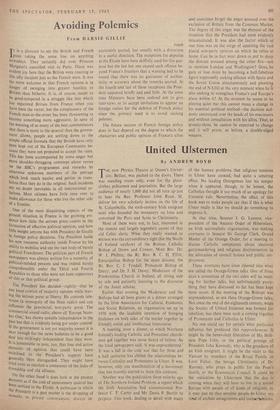United Ulstermen
By ANDREW BOYD
rr HE new Physics Theatre at Queen's Univer-
sity, Belfast, was packed to the doors. There was standing room only, even for the plain- clothes policemen and journalists. But the large audience of nearly 1,000 did not all turn up just to hear the Rev. Professor John Ryan, SJ, deliver his very scholarly lecture on the life of St. Columbcille, the sixth-century Irish emigrant saint who founded the monastery on Iona and converted the Picts and Scots to Christianity.
Most of them were not, in fact, interested in the remote and largely legendary career of that old Celtic cleric. What they really wanted to witness was the extraordinary sight (for the North of Ireland anyhow) of the Roman Catholic Bishop of Down and Connor, Most Rev. Dr. W. J. Philbin; the Rt. Rev. R. C. H. Elliot, Episcopalian Bishop for the same diocese; the Rt. Rev. C. J. Tyndall, Protestant Bishop of Derry; and Dr. J. H. Davey, Moderator of the Presbyterian Church in Ireland, all sitting side by side and patiently listening to the discourse of the Jesuit scholar.
Earlier that evening the Moderator and the Bishops had all been guests at a dinner arranged by the Irish Association for Cultural, Economic and Social Relations, an organisation set up in 1938 with the laudable intention- of bringing Irishmen on both sides of the border together in friendly social and intellectual intercourse.
A meeting, even a dinner, at which Northern Ireland's leading Catholic and Protestant church- men got together was never heard of before. As the local newspapers said, 'it was unprecedented.' It was a lull in the cold war that for three and a half centuries has chilled the relationships be- tween Catholics and Protestants in Ulster. It was, however, only one manifestation of a movement that has recently started to thaw this coldness.
Another was the publication three months ago of The Northern Ireland Problem, a report which the Irish Association had commissioned Pro- fessor C. E. Carter and Mr. Denis P. Barritt to prepare. This book, dealing in detail with many of the human problems that religious tensions in Ulster have created, had quite a sobering effect. No leading Orangeman lost his temper when it appeared, though, to be honest, the Catholics thought it too much of an apology for Unionist rule. Nevertheless, the effect of this book was to make people say that if this is what Ulster really is like we should do something to improve it.
At that time, Senator J. G. Lennon, vice- president of the Ancient Order of Hibernians, an Irish nationalistic organisation, was making overtures to Senator Sir George Clark, Grand Master of the Orange Order, for a meeting to discuss Catholic complaints about electoral gerrymandering and religious discrimination in the allocation of council houses and public em- ployment.
These overtures have since ripened into what are called the Orange-Green talks. One of these days a committee of the two sides will be meet- ing for further talks, but unfortunately every- thing they have discussed so far has been kept most secret. If the meeting of the Bishops was unprecedented, so are these Orange-Green talks. Not since the, end of the eighteenth century, when the Society of United Irishmen was formed for rebellion, has there been such a coming together of Protestants and Catholics in Ulster.
No one could say for certain what particular influence has produced this rapprochement. It might be the benevolent liberalism of His Holi- ness Pope John, or the political prestige of President John Kennedy, who is the grandson of an Irish emigrant. It might be the visits to the Vatican by members of the Royal Family or Lord Fisher, the benign Christianity of Dr. Ramsey, who prays in public for the Pope's health, or the Ecumenical Council. It could be the realisation by Ulstermen that the day is coming when they will have to live in a united Europe with people of all kinds of religions, or it may just be that sensible people in Ulster are tired of archaic antagonisms and useles-Pwasions.


































 Previous page
Previous page